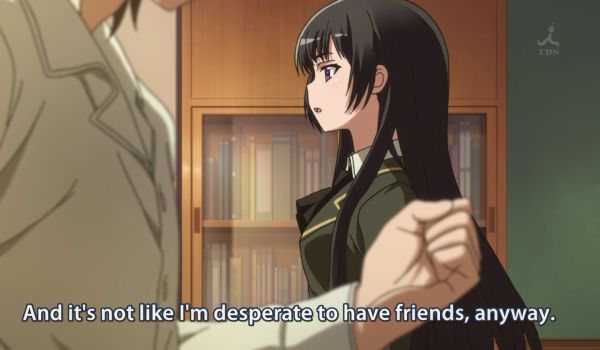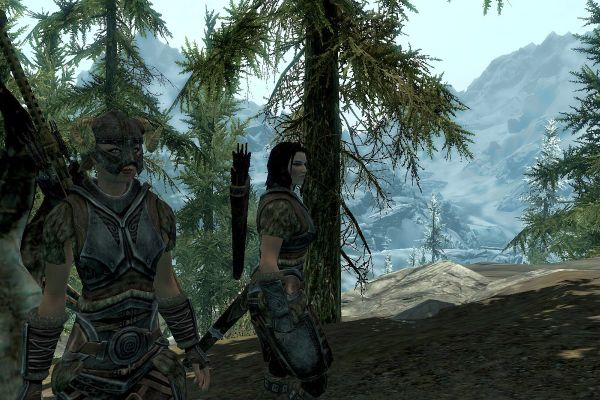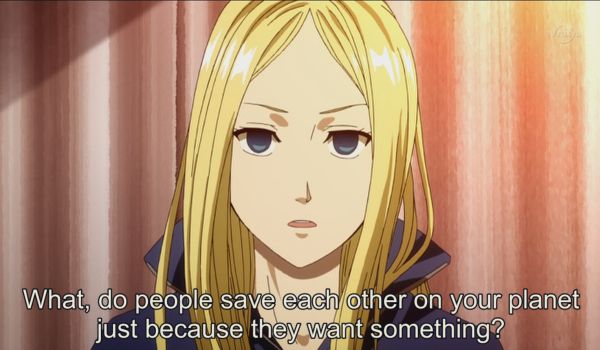
Yozora is not desperate to have friends, because she has books and an invisible friend. Clearly a case of genius! Also note how many thin books there are on the shelf behind her. That’s because they are written in kanji, a much more compact script than ours. Yes, all these things appear in today’s little essay.
“Universal genius” is a literal translation of the Norwegian word “universalgeni”, which is roughly equal to “polymath” in English, but easier to understand. It is actually based on a Latin phrase (“genius universalis”) and is also used in nearby languages.
A related term is “Renaissance man”, as the ideal at the time was a person who was thoroughly familiar with all the arts and sciences. The world had recently emerged from the Middle Ages and retrieved the knowledge of the Classical era of ancient Greece and Rome (with a little help from our Muslim friends, or sometimes enemies). At the same time the printing press had made knowledge easy to spread, and the era of great discoveries had expanded the world greatly. It was a time of opening of the human mind in space and time, leaving the cloistered garden of the previous era. It seemed that nothing would now be impossible. That turned out to be a bit optimistic, of course.
In our modern age, nobody can be an expert in all sciences. In fact, it is probably impossible to be an expert even in one science, such as history or physics or chemistry: They each cover so much ground that you can only have a moderate knowledge of each sub-field, and there will be many, many people who know more than you about the details.
Even so, some of us feel that a broad overview of human knowledge is important. Without it, we cannot easily – if at all – understand our own place in the world. There are those who don’t care: As long as they get paid and preferably enjoy their specialized work, it does not matter to them whether it is meaningful in a broader sense. But not all of us can be satisfied with this. We want to see the world as if from a much higher place, where it becomes obvious how all things are connected. Luckily this is still possible, but perhaps not common.
Universities were founded to give a universal education, as their name implies. I think it is fair to say that things have changed a bit since then, although there is still an element of this expansive role of higher education. Even a century ago, a “liberal education” did not mean being indoctrinated in leftist politics, but rather an education that was free from attachment, a study of knowledge for its own sake or for the sake of the student, rather than associated with a particular career. The original meaning of the “liberal arts” were those that were considered suitable for a free citizen. So universities would teach universal truths with the purpose of setting the student free, to make his own decisions and choose wisely how to contribute to society. (Your university may vary.)
***
Myself, I don’t even have a university education. I have two school years of college-level education, paid by my employer, and it was (unsurprisingly) mainly about economy and law, not philosophy. I have read randomly about the sciences from my early childhood, but did not really think hard about First Principles until middle age. Still, already for many years I have seen the sciences as a vast dome, where there are no lines (much less walls) between each science and its neighbors. For instance, astronomy seamlessly changes into cosmology as the scale of things increases. But cosmology is not the end of the world (except in the most literal sense). It wraps around to quantum physics, which again is fundamental to chemistry, which again cannot be separated from biology and medicine…
I don’t see many people who are even officially interested in seeing the world like this, as an organic unity. It is not something I have striven to achieve, cutting out parts that did not fit in or adding controversial fillers. It is a natural result from grazing all over the place since I was little. My father has a similar attitude, I think, but he grew up in an age where knowledge was hard to come by. So did I, for that matter, but not for as long. Today, the place where I had to dig wells for information is so flooded with it that people are striving not to drown. Information overload.
***
As I said, it is probably not possible to be a universal genius today, but one who still tries is your would-be god and savior from Venus, Ryuho Okawa. Those extraterrestrial and religious aspects may be somewhat creepy, but you can’t go wrong with reading 1000 books a year. Of course, I can’t prove he actually does that, but it certainly looks like he has an extremely wide-ranging knowledge. And it just may be possible in Japan, because Japanese books are mainly written with kanji, signs that represent a basic concept.
There are a bit over 1000 kanji in modern Japanese books and newspapers; most words consist of two kanji, some common words of only one. For grammatical particles and words that lack modern kanji, Japanese use hiragana, a syllabic script (each letter is one syllable rather than one sound). This makes for extremely compact books compared to English, and particularly well suited for speed reading.
When we speed read, we don’t look at the individual letters but use the brain’s amazing pattern matching ability to recognize words or even groups of words by their shape. Expremients have shown that we reogcnize words, epseically long words, mainly by their first and last letter and the length of the word. (Teachers are probably an exception to this as they are conditioned to become very agitated if every letter is not in the right place.)
Japanese, and Chinese even more, skips the whole letter phase and teaches the shapes of the concepts that are the building block of the language. As such, once you know all the signs so well that you don’t have to stop and think, you can read these languages at a ferocious speed. The more you read, the better you get. So 1000 books a year is definitely doable.
For the same reason, I believe that the West will inevitably fall behind in the information age. China, Japan and Korea will dominate the world unless they manage to get themselves into yet another war with each other. It is too late for us to change to a pictographic language now, and we also lack the culture of reverence for learning. We had some of that, but not to the same extent, and it seems to be fading now. Japanese children do as much homework in a day as American children do in a week, according to The Economist. Here in Norway it has been proposed to abolish homework entirely.
To return to what may be the world’s strangest man, Ryuho Okawa, you can (and almost certainly will) be wary of his claims to be a god from outer space and able to summon the spirits of everyone who has ever lived on Earth (and probably Venus as well). But anyone who has written 800 books and reads 1000 books a year is definitely a genius, and probably the closest we come to a “universal genius” these days. Although the words of Aristotle come unbidden to mind: “No great genius has ever existed without a touch of madness.”
It may be that the price of being a universal genius is a touch of universal madness. That would be a high price indeed. Of course, madness may be partly at least in the eye of the beholder. According to the Gospel, Jesus’ family thought he had lost his mind when he was out preaching. I have acquaintances even today who hold the same view on him. And while I am just barely extraordinary myself, I would not be surprised if people are already getting suspicious. Not least after an entry like this. ^_^










